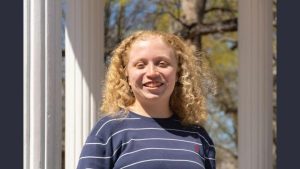Meet Abigail Gillespie, who is a double major in ECL and biology. Gillespie is working on a thesis project examining the role of art in public health communication regarding HIV/AIDS in Kenya.
Gillespie originally planned to major only in biology, but she began to see intersections between medicine and the humanities in her classes: “Upon enrolling at UNC in 2020, my initial focus was on strictly pursuing a major in biology. However, my curiosity about the history of North Carolina, as an out-of-state student, led me to explore ‘African Americans in North Carolina,’ which I took. This experience, along with subsequent classes taught by Dr. Robert Porter, led me to declare a minor in African, African American, and Diaspora Studies. During discussions with Dr. Porter regarding my interest in the intersection of medicine and humanities, particularly through narratives and literature, he recommended that I explore English courses.”
Gillespie’s interest in public health art movements began during her sophomore year and continues to inform her thesis project: “During the summer following my Sophomore year, I participated in the Moore Undergraduate Research Apprentice Program (MURAP) under the mentorship of Dr. Seth Kotch. My project, titled ‘The Art of a Pandemic: Combatting Coronavirus Disease Transmission in Nairobi, Kenya,’ examined Nairobi-based public health art movements, primarily that of the Mathare Roots Youth Initiative in Mathare, with particular emphasis on Brian Musasia Wanyande or Msale, who creates street and graffiti art to emphasize the need to combat disease together. In the subsequent summer, after completing four semesters of Kiswahili instruction with Dr. Raphael Birya, I participated in the Critical Language Scholarship in Arusha, Tanzania. This immersive experience allowed me to improve my Kiswahili speaking abilities and deepen my understanding of East African culture.”
Her thesis project draws on her previous research experience: “Currently, in my sixth semester of Kiswahili instruction, I am collaborating with Dr. Jordynn Jack on a research project examining the role of art in public health communication regarding HIV/AIDS in Kenya. This project investigates the historical context of the AIDS epidemic in Kenya and explores how various forms of art, including posters from the National Library of Medicine and the Library of Congress, have facilitated communication about HIV/AIDS. The project explores the use of music for discussing HIV/AIDS, analyzing the effectiveness of the artists’ choices in conveying messages about the disease. Furthermore, the project explores the concept of body mapping, a deeply personal artistic practice, examining its motivations, intended audience, and therapeutic potential for healing those affected. All in all, the project aims to explain why art serves as an effective tool for communicating about disease and to explore potential avenues for future research in the field.”
Gillespie reflects on the importance of taking the time to explore your options in college: “Having grown up in a rural town in Ohio, my career at UNC-Chapel Hill started without a clear vision of my academic path or the opportunities available. Unaware initially, for example, of the option for undergraduate students to engage in biology labs or the ability to study historical epidemiology, I entered college without a set plan. Life isn’t a race. It’s perfectly acceptable to take a year or two to discover your passions and explore opportunities.”
The skills she has learned in both of her majors have prepared Gillespie for pursuing graduate study as well as a career: “Majoring in Biology and English and Comparative Literature has deeply prepared me for studying historical epidemiology in graduate school but it has also prepared me for any job that I pursue. I have learned how to deeply analyze primary sources and how to go about understanding complex information. My courses, in both majors, have taught me to communicate through writing, speaking, and presenting. These experiences will help me to convey research findings, write reports, publish scholarly articles, and deliver presentations. Today, I am currently involved in the English Department’s HHIVE lab. My goal is to pursue graduate studies in the History of Medicine, combining my interests in literature, history, and epidemiology.”


